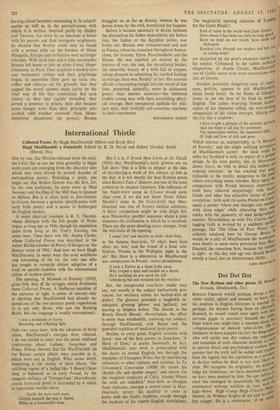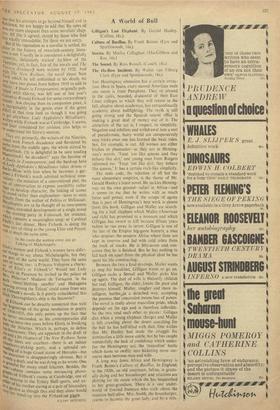Dot Dot Dot
The New Rythum and other pieces. By Ronald Firbank. (Duckworth, 21s.) RONALD FIRBANK would, perhaps, droop a 11,13t white eyelid, aghast and amused, to learn his position in English literature is assured. perhaps, his shyness having been so affectedlYt flaunted, he would vanish once again with thid nervous giggle to sanctuary beneath the labille; from which one might hear a murmur about t is voluptuousness of damask table-cloths. Her fortunate to have escaped (so far) the bi0graP":0 who will surely one day reduce the vagoej'st innuendo nnuendo of such character sketches as to precise detail and psychological realism- guesses that the truth will be sadder and crueact than the legend, but his reputation as a nov i ,elisto' n decline before he died, is not now likelY alter. We recognise his originality, we ackfl°,,d ledge his limitations, we have absorbed him or we have been amused by him. No one befo.f.e since has managed so successfully his seirl° j0 sentimental melange adultere de tout, vvi,,th.„h high- flown High -Camp - High -Church Society, its Wildean heights of wit and its 0 ano °1_ boy snigger. He is a miniaturist: if we ._ r THE SPECTATOR, AUGUST 17. 1962 „Oise that his attempts to go beyond himself .end in flatulence, we are happy to add that his rows of dots are more eloquent than some novelists' chap- ie,rs. All this is agreed, except by those who find h01 Wholly unreadable; for them we are sorry. But if his reputation as a novelist is settled, his „ ce in the history of twentieth-century litera- ture is not. Usually he is considered a delightfully erceentric, 'deliciously wicked' by-blow of the enties; yet, in fact, five of the novels and The wrillilcess Zottbarofl were written by 1920. And .." The New Rythum, the novel about New 'York which he left unfinished at his death, We 12_,Mv have two pieces from before 1910 to add to ,v,dette. .4 Study in Temperament, originally pub,- lished with Odette, was left out of last year s Corn niele Ronald Firbank for some extraordinary r ieason : less cloying than its companion piece, it (;. recognisably in the genre, even if the genre Idn't at that time look as though it was going gel anywhere. Lady .4 ppledore's Mesalliance, written while Firbank was at Cambridge, it seems, nd later considered for revision, also helps us 10 Understand his literary sources. s. ;hey are, primarily, the writers of the Nineties, 1,4 ted with French decadence and flavoured by ?erbs from the middle ages, the whole stirred by mmacterlinck. ('it is delightful to be seen reading qaceterlinek! So decadent!' says the heroine of Study in Temperament, and the hard-up hero p atlY A ppledore's Alesalliance takes Ariane et a"cithe-Rleue with him when he becomes a gar- yeller.) Firbank's much admired technical inno- na,timls—the omission of a conventional plot, the ; of conversation to express sensibility rather b,`,41 10 develop character, the linking of scenes ci! mood rather than explanation—seem to stem 4r.ectlY from the author of Pelleas et Melisande. a is.chapters are to be thought of as tone-poems I'Llities, extended developments of a single mood eN.ening party in Valmouth, for instance, pn.R:,11,. contains a meaningless song: or Cardinal 1"s last dinner. Here Firbank is doing the ariliP son of thing as the young Eliot and Pound. " at Much the same time.
In the room the women come and go ralking of Michelangelo.
ent women and Firbank's women have differ- are things to say about Michelangelo, but they se,- Part of the same world. They have the same tern °I name, too : is Princess Volupine a charac- par°f Eliot's or Firbank's? Would not Lady 111„1a de Panzoust be invited to the palace of illaccus? Madame de Tornquist 'in the 'ho„. room/shifting candles' and Hakagawa among the Titians' could come from any bi novels. Is it purely coincidental that Thoroughfare's ship is the Sesostris? iher i'irhank can be directly connected thus with Of iheginnings of the great revolution in poetry ,,9j°-1925, this only points up the fact that (he ''''ver succeeded, as his contemporaries did withwas born two years before Eliot), in breaking his „the Nineties. Which is, perhaps, to define 'nuitations. They are apparent in the draft of otlatund a bit chapters of The New Rythum..Some strt;r1 ideas are excellent—there is an indoor inaiverry-picking party, and a splendid un- the,..ng 4af. a huge Greek statue of Hercules—but iso/Veurion is disappointingly obvious. But it is a draft, and he was dying as he wrote. One nerterld _for many small felicities. Besides. the Ilittpits'11°Imile contains some entrancing photo- him Firbank's rooms at Cambridge, one of othet!'`I,Tiing in the Trinity Hall sports, and an- in a n,'t his mother staring at a pair of binoculars sio„'Lartien as though they and they alone would ner breaking into the Firbankian giggle.
JULIAN MITCHELL































 Previous page
Previous page